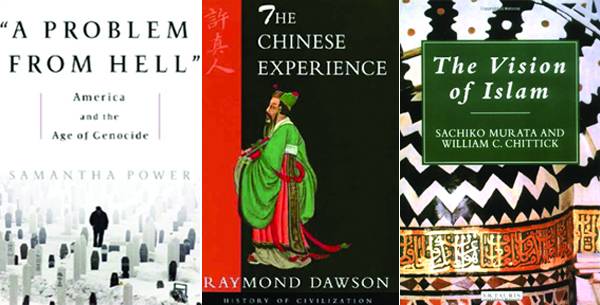
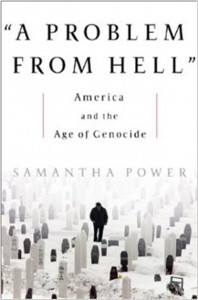
A Problem from Hell: America and the Age of Genocide
Samantha Power
Flamingo (paperback), 2003
PRs 895
Power, a former journalist for US News and World Report and the Economist and now the executive director of Harvard’s Carr Center for Human Rights, offers an uncompromising and disturbing examination of 20th-century acts of genocide and US responses to them. In clean, unadorned prose, Power revisits the Turkish genocide directed at Armenians in 1915-1916, the Holocaust, Cambodia’s Khmer Rouge, Iraqi attacks on Kurdish populations, Rwanda, and Bosnian “ethnic cleansing”, and in doing so argues that US intervention has been shamefully inadequate. The emotional force of Power’s argument is carried by moving, sometimes almost unbearable stories of the victims and survivors of such brutality. Her analysis of US politics what she casts as the State Department’s unwritten rule that non-action is better than action with a PR backlash; the Pentagon’s unwillingness to see a moral imperative; an isolationist right; a suspicious left and a population unconcerned with distant nations aims to show how ingrained inertia is, even as she argues that the US must reevaluate the principles it applies to foreign policy choices. In the face of firsthand accounts of genocide, invocations of geopolitical considerations and studied and repeated refusals to accept the reality of genocidal campaigns simply fail to convince, she insists. But Power also sees signs that the fight against genocide has made progress. Prominent among those who made a difference are Raphael Lemkin, a Polish Jew who invented the word genocide and who lobbied the UN to make genocide the subject of an international treaty, and Senator William Proxmire, who for 19 years spoke every day on the floor of the US Senate to urge the US to ratify the UN treaty inspired by Lemkin’s work. This is a well-researched and powerful study that is both a history and a call to action.
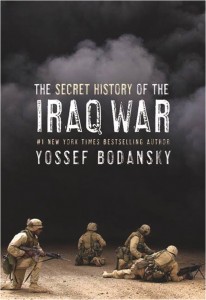
The Secret History of the Iraq War
Yossef Bodansky
ReganBooks (hardcover), 2004
PRs 1015
In the months leading up to March 2003, fresh from its swift and heady victory in Afghanistan, the Bush administration mobilised the United States armed forces to overthrow the government of Iraq. Eight months after the president declared an end to major combat operations, Saddam Hussein was captured in a farmhouse in Al-Dawr. And yet neither peace nor democracy has taken hold in Iraq; instead the country has plunged into terrorist insurgency and guerrilla warfare, with no end in sight. What went wrong?
In The Secret History of the Iraq War, bestselling author Yossef Bodansky offers an astonishing new account of the war and its aftermath—a war that was doomed from the start, he argues, by the massive and systemic failures of the American intelligence community. Drawing back the curtain of politicised debate, Bodansky—a longtime expert and director of the Congressional Task Force on Terrorism and Unconventional Warfare—reveals that nearly every aspect of America’s conflict with Iraq has been misunderstood, in both the court of public opinion and the White House itself. Among his revelations is the most authoritative account of Saddam Hussein’s support for Islamic terrorist organisations—including extensive new reporting on his active cooperation with al Qaeda in Iraq long after the fall of Baghdad. Extensive new information on Iraq’s major chemical and biological weapons programs—including North Korea’s role in building still-undetected secret storage facilities and Iraq’s transfer of banned materials to Syria, Iran, and Libya. The first account of Saddam’s plan for Iraq, Syria, and Iran to join Yasser Arafat’s Palestinian forces to attack Israel, throw the region into turmoil, and upend the American campaign. The untold story of Russia’s attempt to launch a coup against Saddam before the war—and how the CIA thwarted it by ensuring that Iraq was forewarned. Dramatic details about Saddam’s final days on the run, including the untold story of a near miss with US troops and the stunning revelation that Saddam was already in custody at the time of his capture—and was probably betrayed by members of his own Tikriti clan. The definitive account of the anti-US resistance and uprising in Iraq, as the American invasion ignited an Islamic jihad and Iran-inspired intifada, threatening to plunge the region into irreversible chaos fueled by hatred and revenge. Revelations about the direct involvement of Osama bin Laden in the terrorism campaigns in Iraq, Saudi Arabia, and the rest of the Middle East—including the major role played by Iran and Hizbullah in al Qaeda’s operations
Drawing upon an extraordinary wealth of previously untapped intelligence and regional sources, The Secret History of the Iraq War presents the most detailed, fascinating, and convincing account of the most controversial war of our times—and offers a sobering indictment of an intelligence system that failed the White House, the American military, and the people of the Middle East.
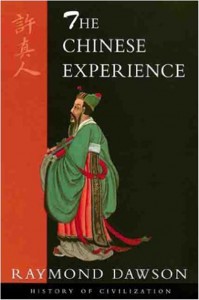
The Chinese Experience
Raymond Dawson
Phoenix Press (paperback), 2005
PRs 870
This book is an extremely well-written overview of the major distinctives of Chinese culture throughout the centuries. I didn’t realize until I read this book why so many other Chinese history/culture books have not resonated well with me. It’s because all the others have tried to tell the Chinese story linearly and chronologically, which is a good way of approaching Western Civilisation (The Greek period, the Roman period, the Dark Ages, the Medieval Ages, the Renaissance, etc.) but not at all the way to look at Chinese history, where so many ideas have remained timeless from dynasty to dynasty, and progress is not measured from one epoch to the next. This book takes a more “horizontal” approach and zeroes in on various aspects of the culture, illuminating the Chinese presuppositions and where they differ from those of the Western mind. It’s lucid, entertaining, and fascinating, neither insulting nor presumptuous about what the reader knows.

The 9/11 Wars
Jason Burke
Allen Lane (paperback), 2011
PRs 1095
Throughout the 1990’s a vast conflict was brewing. The storm broke on September 11th 2001. Since then much of the world has seen invasions, bombings, battles and riots. Hundreds of thousands of people have died.
Jason Burke, a first hand witness of many of the conflict’s key moments, has written the definitive account of its course. At once investigation, reportage and contemporary history, it is based on hundreds of interviews with participants including desperate refugees and senior intelligence officials, ministers and foot-soldiers, active militants and their victims. Burke reveals the true nature of contemporary Islamic militancy and the inside story of the fight against it. He cuts through the myth and propaganda of all sides to reveal the reality behind well known - and lesser known - episodes, and brings characters, voices and a sense of place to a gripping narrative.
The 9/11 Wars is an essential book for understanding the dangerous and unstable twenty-first century. Whether reporting on the riots in France or the killing of Bin Laden, suicide bombers in Iraq or British troops fighting in Helmand, Jason Burke tells the story of a world that changed forever when the hijacked planes flew out of the brilliant blue sky above Manhattan on September 11th 2001.
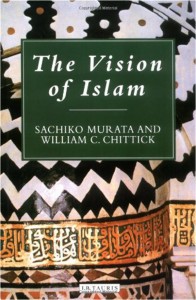
The Vision of Islam
Sachiko Murata and William C. Chittick
I.B. Tauras (paperback), 1994
PRs 695
This introduction to Islam for Western readers explores the fundamental religious beliefs held by Muslims for nearly 1400 years. It covers the four dimensions of Islam - practice, faith, spirituality and the Islamic view of history, as outlined in the Hadith of Gabriel. Interweaving teachings from the Quran, the sayings of the Prophet (pbuh), and the great authorities of the tradition, the book introduces the essentials of each dimension. It then goes on to describe how each has been manifest in Islamic institutions throughout the course of history.

